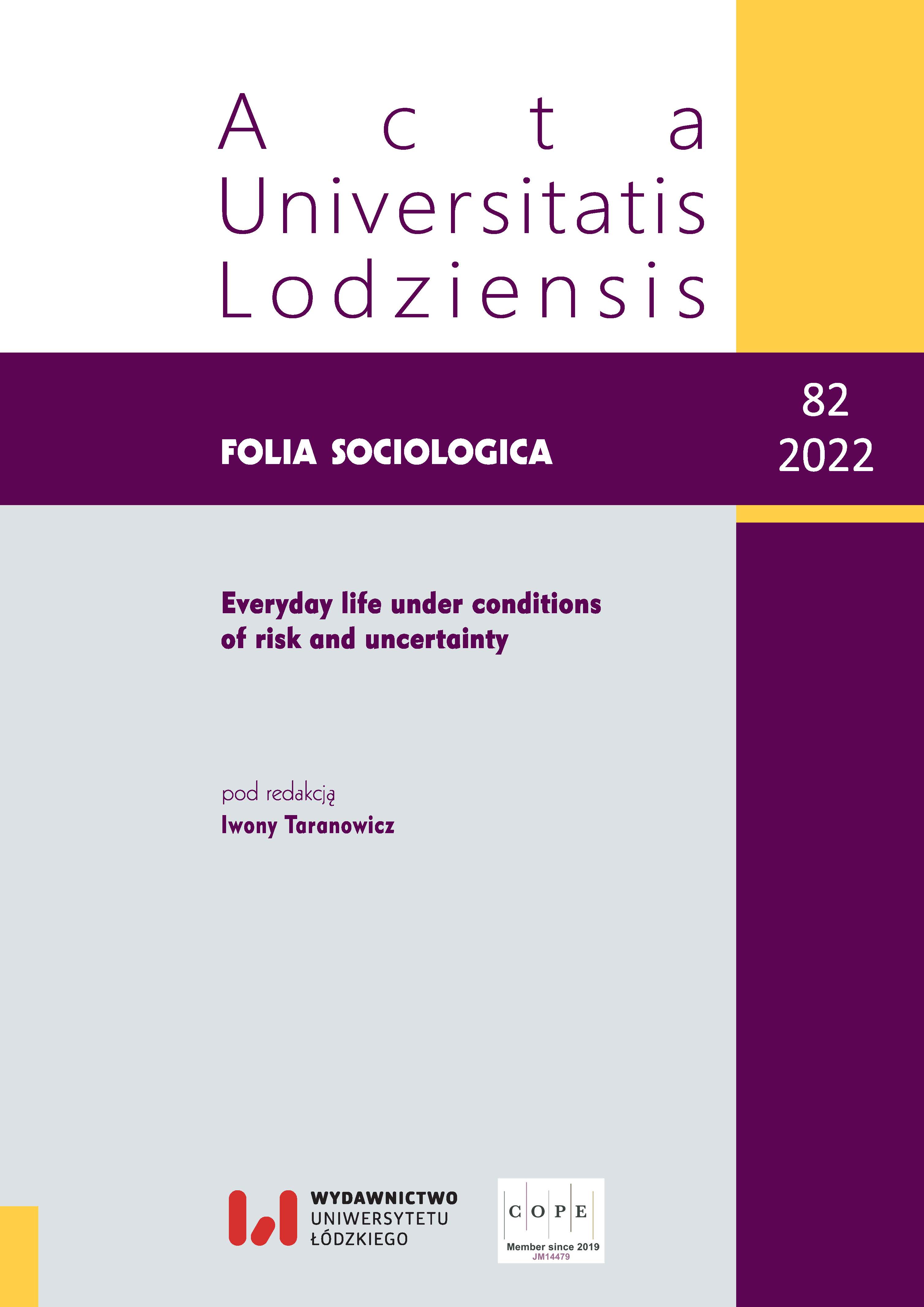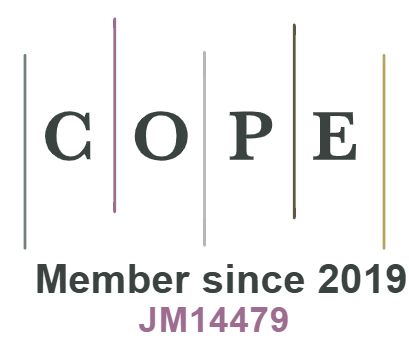Media i zaufanie. O potrzebie poszukiwania informacji w czasach niepewności i jej społecznych konsekwencjach. Przypadek Polski w czasie pandemii wirusa COVID-19
DOI:
https://doi.org/10.18778/0208-600X.82.04Słowa kluczowe:
COVID-19, niepewność, szczepienia, zaufanie, media, dezinformacjaAbstrakt
Pandemia COVID-19 wywołała niepokój i niepewność co do tego, jak funkcjonować normalnie. Luka informacyjna skłoniła ludzi do szukania rozwiązania w mediach, także społecznościowych. Z kolei poleganie na tych ostatnich zwiększa prawdopodobieństwo wiary w teorie spiskowe. Wszystkie te czynniki zostały powiązane z niższym poziomem zachowań zapobiegawczych podczas pandemii COVID-19. Nieustanny zalew (prawdziwych) informacji, dezinformacji i błędnych informacji, czy to wytworzonych przez człowieka, czy przez boty, może być toksyczny, zwłaszcza w połączeniu z nieświadomością tego, czym naprawdę są wiadomości i jak na nas wpływają, zarówno indywidualnie, jak i zbiorowo. Dlatego obecna pandemia jest po części wyzwaniem związanym z filtrowaniem (w czasie rzeczywistym) ogromnej ilości informacji publikowanych codziennie, ale także niezdolnością badaczy, decydentów, dziennikarzy i zwykłych obywateli do nadążania za szybko zmieniającymi się faktami. Zakładam, że w sytuacji niepewności ludzie poszukują informacji, aby podjąć najlepszą decyzję. Przyjmowanie informacji jest wyrazem zaufania do własnych źródeł informacji, w tym zaufania do naukowców i lekarzy lub braku zaufania do decyzji rządowych, a także braku zaufania do firm farmaceutycznych. Większe zaufanie polityczne prowadziło do większej zgodności zachowań z polityką rządu wdrażaną w celu powstrzymania pandemii. Celem artykułu jest pokazanie, które medialne źródła informacji i w jaki sposób stawiały opór wobec działań podejmowanych przez instytucje państwowe i naukowców w sytuacji zagrożenia epidemiologicznego.
Bibliografia
M (2021), State of Science Index https://www.3mpolska.pl/3M/pl_PL/state-of-science-indexbadanie-pl/interaktywne-wyniki/ (accessed: 15.03.2022).
Google Scholar
Allington D., Duffy B., Wesely S., Dhavan N., Rubin J. (2021a), Health-protective behaviour, social media usage and conspiracy belief during the COVID-19 public health emergency, “Psychological Medicine”, vol. 51(10), pp. 1763–1769 https://doi.org/10.1017/S003329172000224X
Google Scholar
DOI: https://doi.org/10.1017/S003329172000224X
Allington D., McAndrew S., Moxham-Hall V.L., Duffy B. (2021b), Media usage predicts intention to be vaccinated against SARS-CoV-2 in the US and the UK, “Vaccine”, vol. 39(18), pp. 2595–2603 https://doi.org/10.1016/j.vaccine.2021.02.054
Google Scholar
DOI: https://doi.org/10.1016/j.vaccine.2021.02.054
Botzen W., Duijndam S., van Beukering P. (2021), Lessons for climate policy from behavioral biases towards COVID-19 and climate change risks, “World Development”, vol. 137, 105214 https://doi.org/10.1016/j.worlddev.2020.105214
Google Scholar
DOI: https://doi.org/10.1016/j.worlddev.2020.105214
Defratyka A. (2020), Nowoczesność i samotność w cyfrowym świecie https://www.pb.pl/czlowiekw-cyfrowym-swiecie/raport/article.html#paragraph-0 (accessed: 15.03.2022).
Google Scholar
Dezinformacja oczami Polaków (2022), https://digitalpoland.org/publikacje (accessed: 13.03.2022).
Google Scholar
Dieckmann N.F., Johnson B.B. (2019), Why do scientists disagree? Explaining and improving measures of the perceived causes of scientific disputes, “PLoS ONE”, vol. 14(2): e0211269 https://doi.org/10.1371/journal.pone.0211269
Google Scholar
DOI: https://doi.org/10.1371/journal.pone.0211269
Douglas K.M., Uscinski J.E., Sutton R.M., Cichocka A., Ang Ch.A., Deravi F. (2019), Understanding conspiracy theories, “Political Psychology”, vol. 40, suppl. 1 https://doi.org/10.1111/pop.12568
Google Scholar
DOI: https://doi.org/10.1111/pops.12568
Eysenbach G. (2020), How to Fight an Infodemic: The Four Pillars of Infodemic Management, “Journal of Medical Internet Research”, vol. 22, no. 6 https://doi.org/10.2196/21820
Google Scholar
DOI: https://doi.org/10.2196/21820
Friedman L., Plumer B. (2020), Trump’s Response to Virus Reflects a Long Disregard for Science, “New York Times” (28 April) https://www.nytimes.com/2020/04/28/climate/trump-coronavirusclimate-science.html (accessed: 18.05.2020).
Google Scholar
Funk C. (2017), Mixed Messages about Public Trust in Science https://www.pewresearch.org/science/2017/12/08/mixed-messages-about-public-trust-in-science/ (accessed: 15.03.2022).
Google Scholar
Glasdam S., Stjernswärd S. (2020), Information about the COVID-19 pandemic – A thematic analysis of different ways of perceiving true and untrue information, “Social Sciences & Humanities Open”, vol. 2, issue 1 https://doi.org/10.1016/j.ssaho.2020.100090
Google Scholar
DOI: https://doi.org/10.1016/j.ssaho.2020.100090
Grabowski M., Zając A. (2009), Dane, informacja, wiedza – próba definicji, “Zeszyty Naukowe Uniwersytetu Ekonomicznego w Krakowie”, no. 798.
Google Scholar
Greco V., Roger D. (2001), Coping with Uncertainty: The Construction and Validation of a New Measure, “Personality and Individual Differences”, vol. 31(4), pp. 519–534 https://doi.org/10.1016/S0191-8869(00)00156-2
Google Scholar
DOI: https://doi.org/10.1016/S0191-8869(00)00156-2
Kabat-Zinn J. (2020), I read the news today, oh boy, “Mindfulness”, vol. 11, pp. 1570–1574 https://doi.org/10.1007/s12671-020-01356-z
Google Scholar
DOI: https://doi.org/10.1007/s12671-020-01356-z
Khubchandani J., Sharma S., Price J.H., Wiblishauser M.J., Sharma M., Webb F.J. (2021), COVID-19 vaccination hesitancy in the United States: A rapid national assessment, “Journal of Community Health”, vol. 46(2), pp. 270–277 https://doi.org/10.1007/s10900-020-00958-x
Google Scholar
DOI: https://doi.org/10.1007/s10900-020-00958-x
Krause N.M., Wirz C.D., Scheufele D.A., Xenos M.A. (2019), Fake news: A new obsession with an old phenomenon?, [in:] J.E. Katz, K.K. Mays (eds.), Journalism and truth in an age of social media, Oxford University Press, Oxford.
Google Scholar
DOI: https://doi.org/10.1093/oso/9780190900250.003.0005
Liang L.-L., Tseng C.-H., Ho H.J., Wu C.-Y. (2020), Covid-19 mortality is negatively associated with test number and government effectiveness, “Scientific Reports”, no. 10(1), 12567.
Google Scholar
DOI: https://doi.org/10.1038/s41598-020-68862-x
Matsushima M., Tsuno K., Okawa S., Hori A., Tabuchi T. (2021), Trust and well-being of postpartum women during the COVID-19 crisis: Depression and fear of COVID-19, “SSM – Population Health”, vol. 15 https://doi.org/10.1016/j.ssmph.2021.100903
Google Scholar
DOI: https://doi.org/10.1016/j.ssmph.2021.100903
Morales G.I., Lee S., Bradford A., De Camp A., Tandoc Jr. E.C. (2022), Exploring vaccine hesitancy determinants during the COVID-19 pandemic: An in-depth interview study, “SSM – Qualitative Research in Health”, no. 2 https://doi.org/10.1016/j.ssmqr.2022.100045
Google Scholar
DOI: https://doi.org/10.1016/j.ssmqr.2022.100045
O’Shea B.A., Ueda M. (2021), Who is more likely to ignore experts’ advice related to COVID-19?, “Preventive Medicine Reports”, vol. 23 https://doi.org/10.1016/j.pmedr.2021.101470
Google Scholar
DOI: https://doi.org/10.1016/j.pmedr.2021.101470
Pogue K., Jensen J.L., Stancil C.K., Ferguson D.G., Hughes S.J., Mello E.J., Burgess R., Berges B.K., Quaye A., Poole B.D., (2020), Influences on attitudes regarding potential COVID-19 vaccination in the United States, “Vaccines”, vol. 8(4), pp. 1–14 https://doi.org/10.3390/vaccines8040582
Google Scholar
DOI: https://doi.org/10.3390/vaccines8040582
Roberts C.H., Brindle H., Rogers N.T., Eggo R.M., Enria L., Lees S. (2021), Vaccine confidence and hesitancy at the start of COVID-19 vaccine deployment in the UK: An embedded mixedmethods study, “Frontiers in Public Health”, no. 9 https://doi.org/10.3389/fpubh.2021.745630
Google Scholar
DOI: https://doi.org/10.3389/fpubh.2021.745630
Sadowski R. (2021), Raport Newspoint: Szczepionki przeciw COVID https://www.newspoint.pl/blog/raport-newspoint-szczepionki-przeciw-covid (accessed: 5.03.2022).
Google Scholar
Scheufele D.A., Krause N.M., Freiling I. (2021), Misinformed About The “Infodemic?” Science’s Ongoing Struggle With Misinformation, “Journal of Applied Research in Memory and Cognition”, vol. 10, issue 4, pp. 522–526 https://doi.org/10.1016/j.jarmac.2021.10.009
Google Scholar
DOI: https://doi.org/10.1016/j.jarmac.2021.10.009
Schoch-Spana M., Brunson E.K., Long R., Ruth A., Ravi S.J., Trotochaud M., Borio L., Brewer J., Buccina J., Connell N., Lee Hall L., Kass N., Kirkland A., Koonin L.,
Google Scholar
Larson H., Fisher Lu B., Omer S.B., Orenstein W.A., Poland G.A., Privor-Dumm L., Crouse Quinn S., Salmon D., White A. (2021), The public’s role in COVID-19 vaccination: Human-centered recommendations to enhance pandemic vaccine awareness, access, and acceptance in the United States, “Vaccine”, vol. 39 https://doi.org/10.1016/j.vaccine.2020.10.059
Google Scholar
DOI: https://doi.org/10.1016/j.vaccine.2020.10.059
Sentiment Analysis (2021a) https://szczepimysie.pl/analiza-nastrojow-w-internecie-dotyczacatematyki-szczepien-przeciw-covid-19-za-okres-13-19-grudnia-2021/ (accessed: 5.03.2022).
Google Scholar
Sentiment Analysis (2021b), https://szczepimysie.pl/analiza-nastrojow-w-internecie-dotyczacatematyki-szczepien-przeciw-covid-19-za-okres-20-29-grudnia-2021/ (accessed: 5.03.2022).
Google Scholar
Soral W., Bilewicz M., Wypych M. (2021), Gotowość Polaków, Niemców i Brytyjczyków do szczepień obowiązkowych i dobrowolnych http://cbu.psychologia.pl/wp-content/uploads/sites/410/2021/05/RaportOSzczepieniachv4.pdf (accessed: 5.03.2022).
Google Scholar
Spiekermann R., Kienberger S., Norton J., Briones F., Weichselgartner J. (2015), The Disaster-Knowledge Matrix – Reframing and evaluating the knowledge challenges in disaster risk reduction, “International Journal of Disaster Risk Reduction”, vol. 13, pp. 96–108.
Google Scholar
DOI: https://doi.org/10.1016/j.ijdrr.2015.05.002
Weick K.E., Sensemaking in Organisations, Sage, London 1995.
Google Scholar
World Health Organization (WHO) (2016), Global diffusion of eHealth: Making universal health coverage achievable, December.
Google Scholar
Zhong Y., Liu W., Lee T.-Y., Zhao H., Ji J. (2021), Risk perception, knowledge, information sources and emotional states among COVID-19 patients in Wuhan, China, “Nurs Outlook”, vol. 69(1) https://doi.org/10.1016/j.outlook.2020.08.005
Google Scholar
DOI: https://doi.org/10.1016/j.outlook.2020.08.005
Zychowicz I., Halista-Telus E. (2021), Poczucie bezpieczeństwa i zaufania społecznego w obliczu
Google Scholar
pandemii, “Państwo i Społeczeństwo”, no. 2, pp. 91–105.
Google Scholar
https://dailyexpose.uk/2022/03/02/covid-putin-no-threat-to-freedom-gates-trudeau-are/ (accessed: 15.03.2022).
Google Scholar
https://en.wikipedia.org/wiki/Natural_News (accessed: 15.03.2022).
Google Scholar
https://konkret24.tvn24.pl/swiat,109/trendy-w-dezinformacji-2021-roku-jak-przekroczono-kolejnegranice,1089944.html (accessed: 15.03.2022).
Google Scholar
https://pl.wikipedia.org/wiki/Gab (accessed: 15.03.2022).
Google Scholar
https://scientistsforsciencebasedpolicy.org/ (accessed: 27.08.2022).
Google Scholar
https://spidersweb.pl/rozrywka/2020/12/15/wrealu24-marcin-rola-youtube-ban-covid (accessed: 15.03.2022).
Google Scholar
https://wrealu24.tv/o_nas (accessed: 15.03.2022).
Google Scholar
https://www.bibula.com/?p=129732 (accessed: 15.03.2022).
Google Scholar
https://www.odkrywamyzakryte.com/grypa-hiszpanka/ (accessed: 15.03.2022).
Google Scholar
https://www.reuters.com/article/factcheck-vaids-fakes-idUSL1N2UM1C7 (accessed: 15.03.2022).
Google Scholar
https://www.vox.com/recode/2020/6/25/21293246/facebook-misinformation-natural-news-conspiracytheory (accessed: 15.03.2022).
Google Scholar
https://www.wirtualnemedia.pl/artykul/wrealu24-tv-usuniety-z-youtube-za-mowe-nienawisci-marcinrola-zyjemy-w-czasach-pelzajacego-totalitaryzmu (accessed: 15.03.2022).
Google Scholar
Pobrania
Opublikowane
Jak cytować
Numer
Dział
Licencja

Utwór dostępny jest na licencji Creative Commons Uznanie autorstwa – Użycie niekomercyjne – Bez utworów zależnych 4.0 Międzynarodowe.










